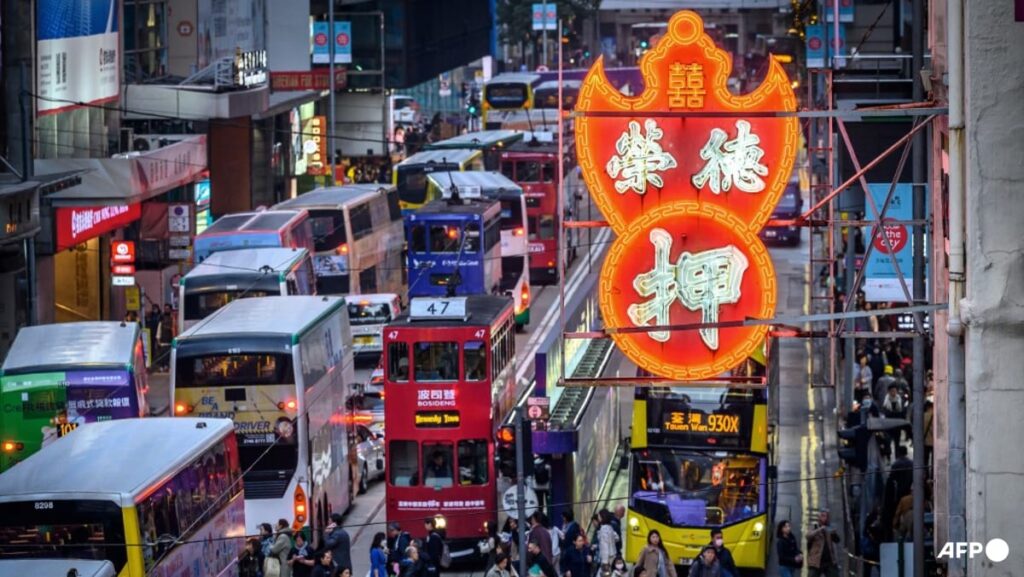“IN-BETWEEN STATUS”
Over the last two years, Beijing has exhorted the city to prioritise economic growth, leveraging its unique perch as a capitalist enclave under the “one country, two systems” framework.
Yet Hong Kong grapples with striking a delicate equilibrium between security and development, and between deeper integration into the mainland economy and its role as a regional hub for international business.
Recent flashpoints underscore the tension. In March 2025, state-backed media unleashed blistering criticism against tycoon Li Ka-shing’s CK Hutchison Holdings for its plan to sell strategic Panama Canal ports to a consortium led by US financial behemoth BlackRock, branding the move a “betrayal” and “spineless capitulation”.
Similarly, early this month, Beijing’s top diplomat in Hong Kong warned the newly arrived US Consul General Julie Eadeh against “colluding with anti-China forces”, after she met with local civil society figures.
Contrary to fears that Hong Kong would be collateral damage in the US-China showdown, its liminal “in-between” status is proving a surprising asset. The mainland stimulus not only juiced stocks but also amplified Hong Kong’s appeal as a conduit for global capital into China.
Looking ahead, the city stands to gain from cross-border talent flows. In the US, President Donald Trump’s aggressive crackdown on elite universities like Harvard and restrictions on foreign scholars have unnerved Chinese students and scientists, many of whom view Hong Kong as a lifeline.
Its capitalist ethos, English common law, and open access to Western platforms like Google and Facebook, which are banned on the mainland, make it an alluring alternative.
Beijing’s blessings have supercharged this trend. Hong Kong’s talent admission schemes, offering low taxes and top-tier international schools, have magnetised mainland professionals eager for global exposure while securing better futures for their children.
Since 2022, these programmes have fielded nearly 500,000 applications, approving over 330,000 and welcoming more than 230,000 arrivals. The government’s back-patting as an “international talent hub” rings somewhat hollow though, as the vast majority hail from the mainland, raising eyebrows about diversity and true global pull.
These newcomers will undoubtedly invigorate the economy, restoring the frenetic energy of old. But they also fuel anxieties over whether Hong Kong can preserve its status as an international business nexus amid ballooning geopolitical friction.
Officials have pivoted toward forging economic ties with Middle Eastern powerhouses and Belt and Road Initiative partners, with Dubai and Qatar emerging as favoured haunts. This shift isn’t whimsical: US sanctions on senior figures, including Hong Kong Chief Executive John Lee, have hamstrung outreach to traditional business partners like the US, UK, and Europe, forcing a reorientation.
The result? Apprehensions that Hong Kong is settling for a diminished role – a regional player on par with Dubai – rather than reclaiming its perch as a global financial titan rivalling New York and London.
As China’s leaders convene imminently to chart the 2026-2030 Five-Year Plan against a backdrop of roiling geopolitics, repositioning Hong Kong must rise to the fore.
It needs to make the city indispensable to China’s modernisation and equally indispensable to global capital seeking exposure to China and Asia.
To deliver that dual indispensability, Hong Kong must navigate these currents with nuance – honouring Beijing’s directives while safeguarding the openness that once defined it as Asia’s unrivalled world city.
Wang Xiangwei is a former Editor-In-Chief of South China Morning Post. He now teaches journalism at Hong Kong Baptist University.
https://www.channelnewsasia.com/commentary/hong-kong-recover-china-asia-world-city-positioning-five-year-plan-5388991


